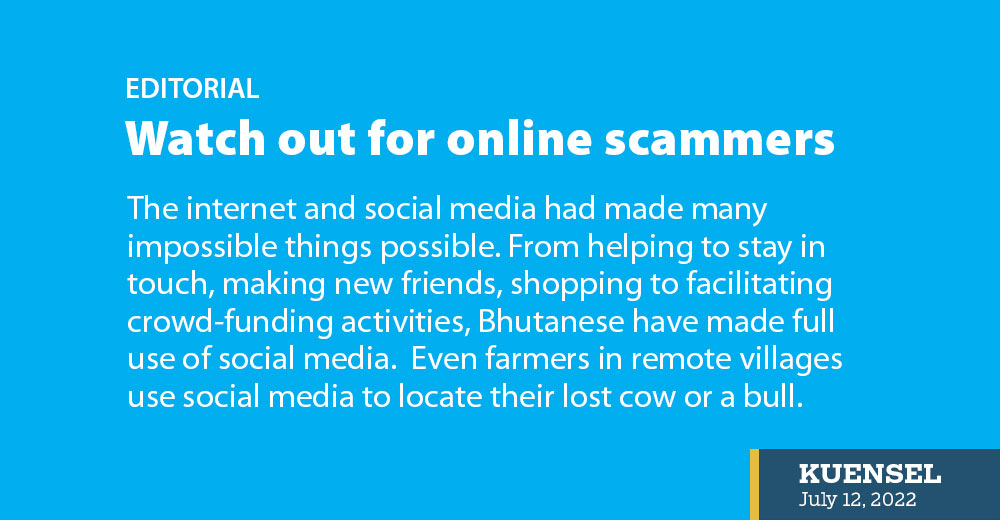The internet and social media had made many impossible things possible. From helping to stay in touch, making new friends, shopping to facilitating crowd-funding activities, Bhutanese have made full use of social media. Even farmers in remote villages use social media to locate their lost cow or a bull.
It also, however, resulted in many cyber crimes, including financial crimes like Ponzi investment schemes and looting money through impersonation on social media. Online scammers thrive in the age of social media.
Scammers these days are targeting gullible social media users, hacking social media pages and impersonating friends to borrow money, promising they would return in the evening or the next day.
In our close-knit society, we only check if there is adequate bank balance when we receive such requests and immediately transfer the money. We don’t check if it is genuinely our friend and relative or a scammer behind the request. In a recent case, a civil servant knew scammers used her to con her friends only when a friend called to inform her she deposited Nu 10,000. It was too late by then. The money has been transferred to three people when she realised the amount was fraudulently acquired.
Many involved claimed innocence and said they gave their account number to strangers on request and did not foresee any issues. The scammer, according to the victim, has taken advantage of the recent tech glitch of Bank of Bhutan’s ‘Mbob’ facility.
During the peak of lockdown restrictions, many Thimphu residents were scammed while looking for houses. A woman claimed she has an apartment for rent and duped people to deposit the security amount. We also hear many stories of how people are duped through online businesses, with many taking advance payment and deleting the account later or refusing to respond. Online shopping fraud has been going on for a while.
With more than 90 percent of the Bhutanese population using social media and three-fourths of the social media users having little or no knowledge of privacy, ethical and safety issues, cybercrime is only going to get worse. It is time relevant agencies create some awareness of social media literacy and safety.
As social media users, it is important we understand we are being scammed the moment someone is asking for your bank details or personal information. If a friend or relative asks for money online, call them. Let us resist the urge to act immediately and crosscheck when someone asks for money.
If you think you are being scammed, upgrade your social media page security and also lodge complaint to the nearest police station. Social media had helped people with genuine needs. It had helped people raise fund for genuine cause like funding an organ transplant or saving the lives of animals. The scams could not only rob people, but also put to an end the fund raising initiatives for genuine and emergency cases.


